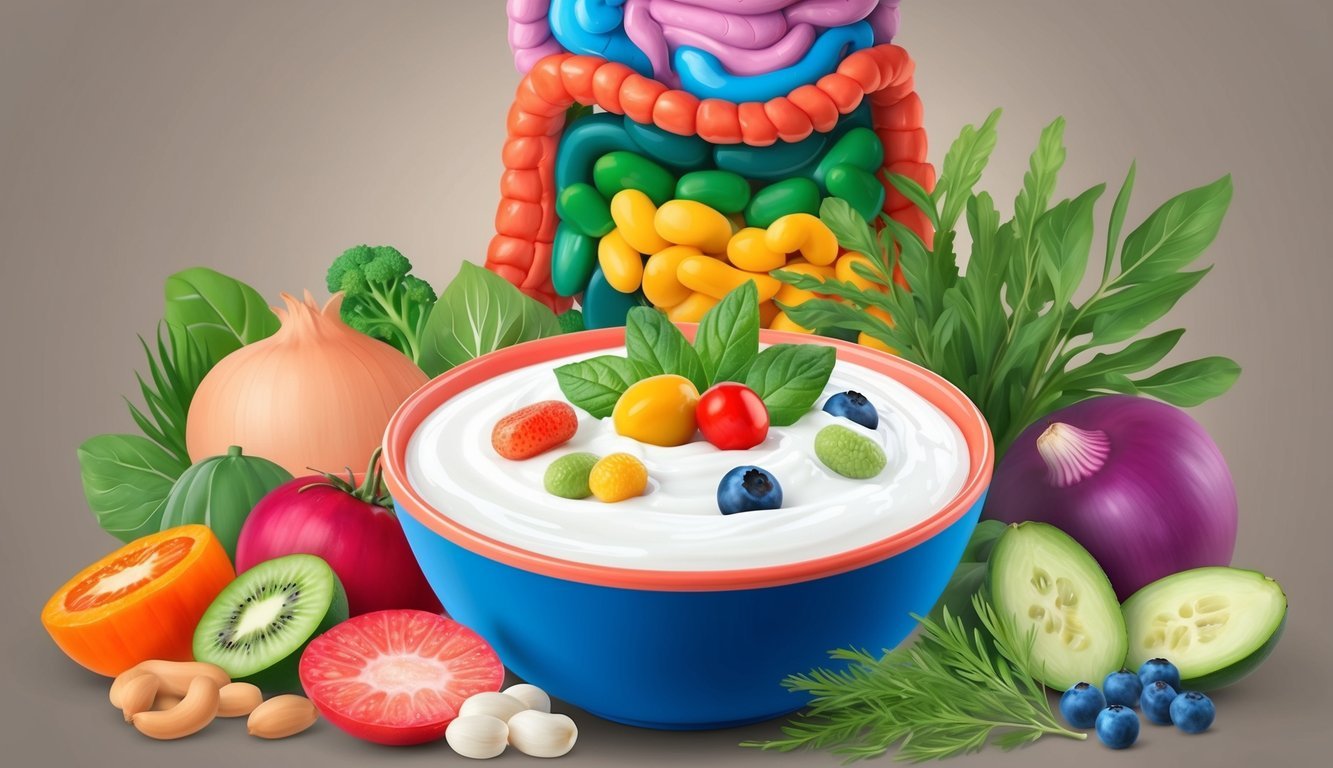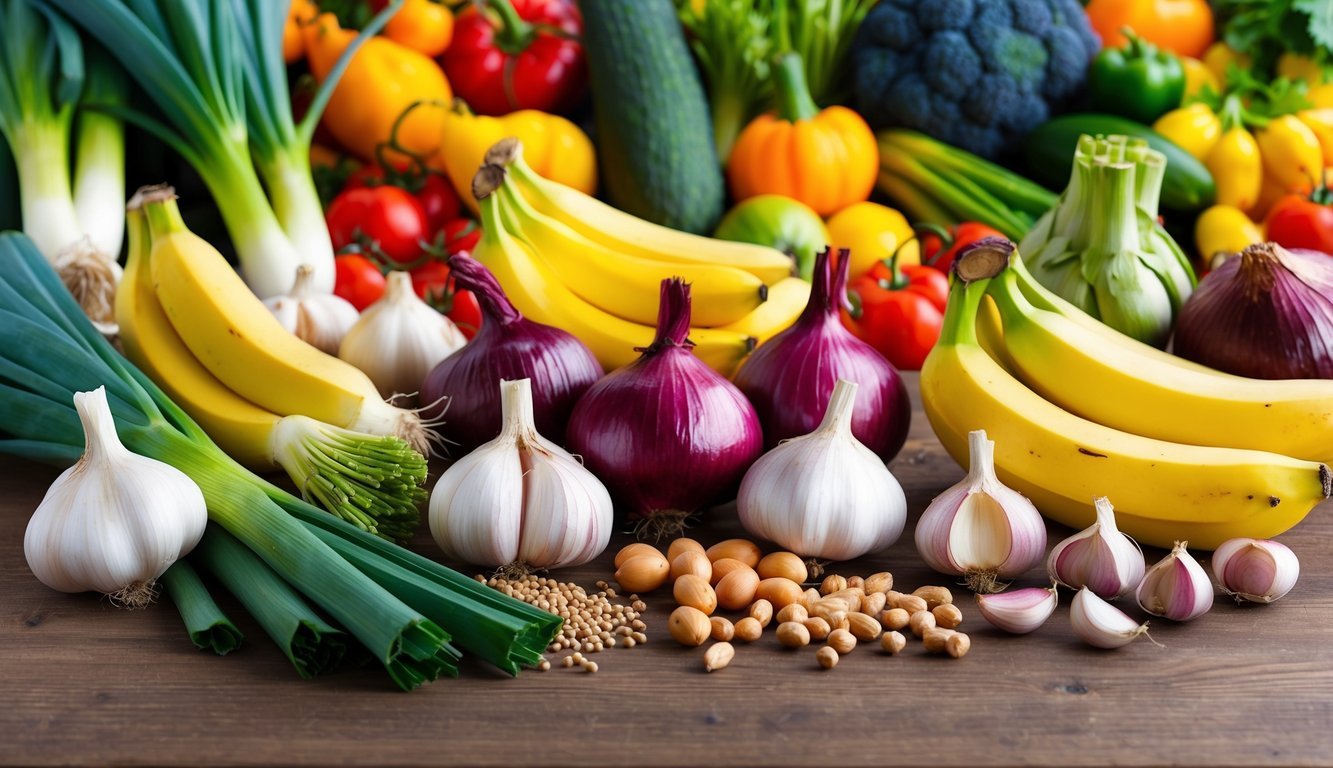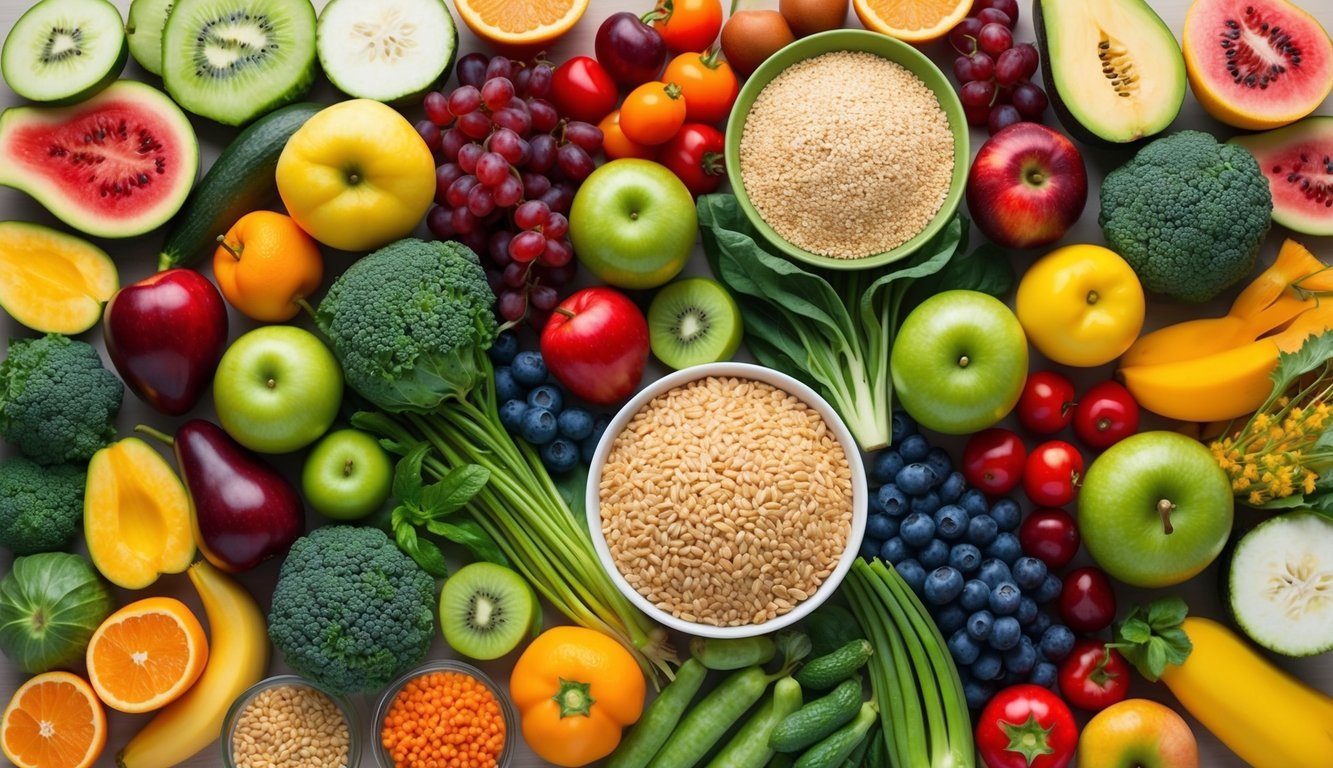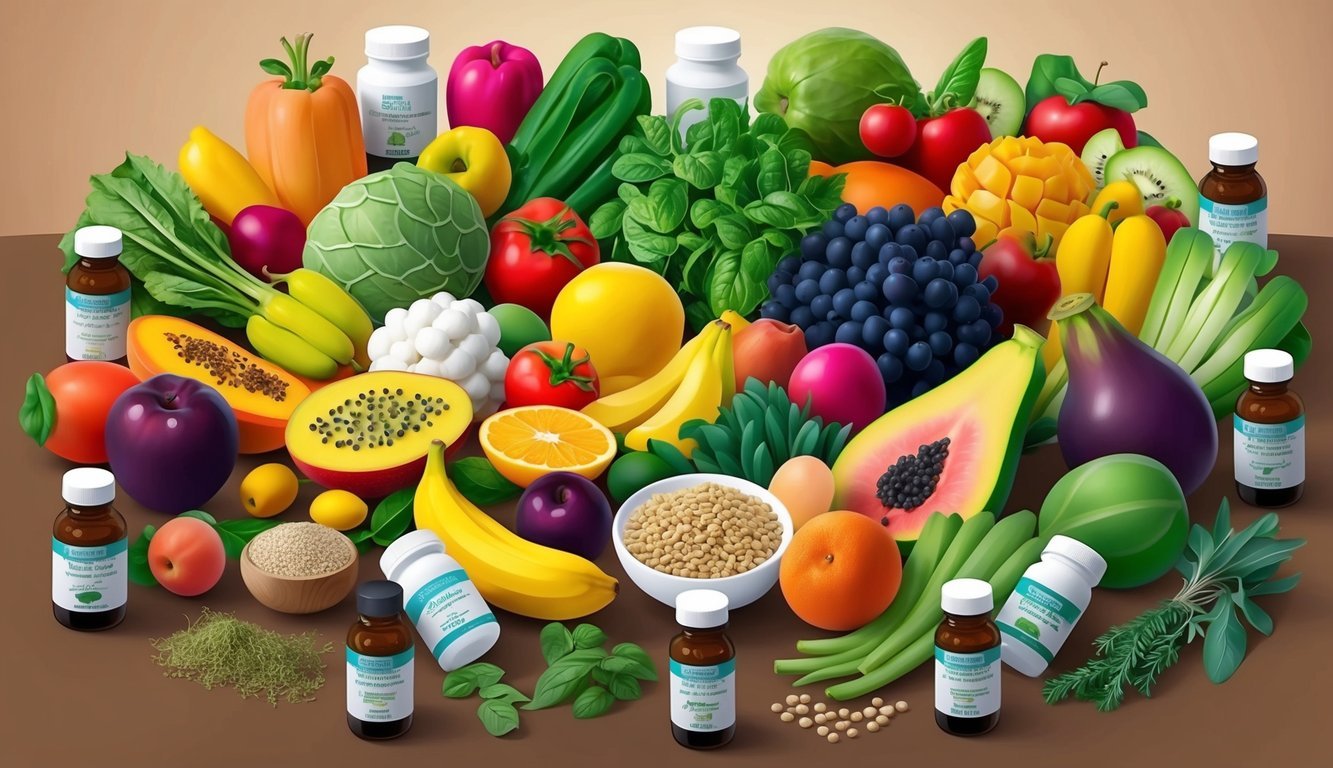I’ve been diving into the topic of gut health lately, and it’s fascinating how much it impacts our overall well-being.
Many people may not realize that a balanced gut microbiome plays a significant role in digestion, immunity, and even mood. Improving gut health can lead to better digestion, enhanced immune function, and a more positive mood.

Throughout my journey, I’ve discovered various methods to boost gut health and restore balance.
From dietary changes to lifestyle adjustments, these approaches are not only effective but also quite manageable for everyday life.
By making some simple tweaks, I believe anyone can take significant steps toward a healthier gut.
1) Eat More Fermented Foods
I’ve discovered that incorporating fermented foods into my diet can really benefit gut health.
These foods are packed with probiotics, which are live microorganisms that support digestion.
Foods like sauerkraut, kimchi, and yogurt are not just tasty—they’re great for my gut.
Kefir, a fermented drink made from milk, has become a favorite of mine.
It’s creamy and offers a refreshing twist, plus it has a ton of beneficial bacteria.
Just a small serving can make a difference.
Miso, often used in soups, adds depth to my meals.
It’s not only flavorful but also aids digestion.
I enjoy using it as a seasoning in various dishes.
The variety of fermented foods means I can easily find options I love.
Whether I’m snacking on some pickles or adding tempeh to my stir-fry, these foods help keep my gut balanced.
Plus, they’re fun to experiment with in the kitchen.
2) Include a variety of fiber-rich veggies
Incorporating fiber-rich vegetables into my diet is a game changer for gut health.
Fiber helps maintain regular digestion and feeds the good bacteria in my gut.
Some of my favorite options include artichokes and broccoli.
Artichokes pack about 7 grams of fiber, while broccoli adds an extra 5 grams per cooked cup.
These veggies are not only nutritious but also tasty.
Leafy greens like kale and spinach are also essentials.
They are full of antioxidants and nutrients that support my overall health.
Plus, they can be added to various dishes easily.
I also enjoy snacking on raw carrots or adding onions to my meals.
Onions offer about 9 grams of fructans per cup, which can be beneficial for gut microbes.
Raspberries make my breakfast more exciting too.
With 6 grams of fiber per cup, they’re perfect on cereal or blended in a smoothie.
Mixing different fiber-rich veggies keeps my meals interesting and supports my gut balance.
It’s simple and delicious!
3) Drink probiotic-rich kefir
I love starting my day with a glass of kefir.
This fermented drink is packed with probiotics, which are great for gut health.
Kefir helps maintain a healthy balance of bacteria in my gut.
This balance is key for digestion and can prevent issues like bloating and constipation.
I’ve noticed that drinking kefir can also support my immune system.
It contains beneficial nutrients that help my body fight off common illnesses.
For those concerned about sugar, kefir is a good option.
Studies suggest it may help manage blood sugar levels.
I appreciate that kefir is versatile.
I can use it in smoothies, salad dressings, or even just drink it plain.
Including this probiotic-rich drink in my diet has made a noticeable difference in how I feel.
It’s a simple change that packs a punch for my digestive health.
4) Eat yogurt with live cultures

I really enjoy adding yogurt with live cultures to my diet.
It’s an easy way to boost gut health.
Yogurt is packed with probiotics, which are beneficial bacteria that help balance the microbiome in my gut.
When I choose yogurt, I look for ones that specifically mention live cultures.
This ensures I’m getting the probiotics I need.
Brands like Stonyfield and Siggi’s are great options because they offer creamy textures and good nutrition without too much sugar.
Eating yogurt regularly can also aid in digestion.
The live cultures can help restore the natural balance of flora in my gut, making it easier for me to absorb nutrients.
Plus, it’s a tasty snack or breakfast choice that’s high in protein and calcium.
I often add fruits or nuts to my yogurt for extra flavor.
This way, I can enjoy a delicious treat while supporting my digestive health.
It’s a simple habit that makes a noticeable difference.
5) Add prebiotic foods like garlic

I love incorporating prebiotic foods into my diet, and garlic is one of my favorites.
Not only does it add incredible flavor to meals, but it also supports gut health.
Garlic belongs to the allium family, which includes onions and leeks.
It contains fructans, a type of prebiotic fiber that feeds the good bacteria in my gut.
This helps promote a balanced microbiome.
When I cook, I often toss in extra garlic.
Whether it’s in a stir-fry, pasta, or roasted vegetables, the taste is fantastic and healthy.
Besides garlic, other prebiotic foods worth exploring include leeks, onions, and asparagus.
Adding a variety of these foods can enhance gut health and digestion.
It’s easy to make simple changes to my meals.
Just by focusing on prebiotics like garlic, I feel like I’m being proactive about my digestive well-being.
Plus, who doesn’t enjoy the rich flavor it brings to my dishes?
6) Consume bone broth regularly

I find that incorporating bone broth into my diet has made a noticeable difference in my gut health.
It’s made from simmering animal bones and connective tissues, which releases beneficial nutrients.
Bone broth is rich in collagen, amino acids, and minerals that can help support digestive wellness.
I appreciate its soothing properties, especially when my digestion feels off.
Drinking it regularly can help repair the gut lining.
This is especially helpful for anyone experiencing digestive discomfort or trying to balance their microbiome.
I usually enjoy bone broth as a warm drink or use it as a base for soups and stews.
It’s a versatile option that adds flavor and nourishment to meals.
I aim for a few servings each week to get the most benefit.
Whether I sip it on its own or include it in recipes, I notice improvements in my overall gut health.
7) Reduce sugar intake

Reducing sugar in my diet has been a game changer for my gut health.
I realized that many beverages, like sodas and flavored coffees, are loaded with added sugars.
Swapping these for water or unsweetened drinks made a noticeable difference.
I also pay attention to hidden sugars in foods.
Snacks and sauces can have surprising amounts of sugar, which can disrupt gut balance.
Checking labels helps me avoid unnecessary sugar.
Fruits can satisfy my sweet tooth without the added sugars found in processed foods.
I focus on whole fruits instead of juices or sugary snacks.
Those natural sugars come with fiber, which is beneficial for digestion.
Incorporating these changes has not only improved my gut health but has also boosted my energy levels.
Less sugar feels like a positive step toward better overall well-being.
Making small adjustments over time makes it manageable and sustainable.
8) Stay hydrated with water

Staying hydrated is essential for my gut health.
Water plays a crucial role in digestion and nutrient absorption.
Without enough water, my body struggles to process food properly.
I’ve noticed that when I drink enough water, my digestion feels smoother.
It helps keep things moving in my gastrointestinal tract.
Proper hydration also supports the production of digestive juices.
I aim to drink water throughout the day, not just when I’m thirsty.
Sometimes, I add a little slice of lemon or cucumber for flavor.
This makes drinking water more enjoyable and refreshing.
If plain water feels boring, I incorporate water-rich foods like watermelon and cucumber into my meals.
These foods not only provide hydration but also essential nutrients.
Keeping my hydration levels up has made a noticeable difference in how I feel.
It’s a simple step that goes a long way in supporting my gut health.
Plus, it makes me feel more energized overall.
9) Exercise regularly for gut mobility

I’ve found that staying active can really enhance gut mobility.
Regular exercise promotes movement in the digestive tract.
This means food moves more efficiently through my system.
I don’t need intense workouts to get the benefits.
Even simple activities, like walking or light stretching, can make a difference.
It helps reduce issues like bloating or constipation.
Research shows exercise can improve gut microbiome diversity.
A varied gut microbiome is crucial for good digestion and overall gut health.
It’s like giving my gut a diverse selection of healthy bacteria to thrive.
Incorporating different forms of exercise can be fun.
Yoga, for instance, can help with digestion and reduce stress.
Stress can negatively impact gut health, so managing it is key.
I try to find activities I enjoy.
This makes it easier to stick to a routine.
Whether it’s dancing, cycling, or gardening, staying active can keep my gut happy and healthy.
10) Limit antibiotics when possible

When I think about gut health, one key takeaway is to avoid antibiotics unless absolutely necessary.
These medications can disrupt the balance of bacteria in my gut, often wiping out beneficial microbes along with the harmful ones.
I’ve learned that not every infection requires antibiotics.
Simple infections can often be managed with rest, hydration, and over-the-counter remedies.
By saving antibiotics for serious infections, I can help maintain a healthier gut environment.
If I ever do need to take antibiotics, I make sure to follow up with probiotics and prebiotic foods.
This way, I can support my gut health as it recovers from any disruption.
I also focus on a varied diet rich in fiber and whole foods.
This choice nurtures my gut and encourages the growth of good bacteria.
By being mindful of my antibiotic use, I can play a role in preserving the balance of my gut microbiome.
Understanding Gut Health
Gut health is all about the balance of bacteria in my digestive system and how it affects my overall well-being.
I often find it fascinating that these tiny microorganisms play such a big role in my health, from digestion to immune response.
Let’s break this down into key areas.
The Role of the Microbiome
The microbiome is a complex ecosystem of trillions of bacteria residing in my gut.
This community primarily helps with digesting food, but its functions extend far beyond that.
It synthesizes vitamins, supports the immune system, and even communicates with my brain through the gut-brain axis.
Not all bacteria are created equal.
The balance of good and bad bacteria is crucial.
A diverse microbiome rich in beneficial bacteria promotes health, while an imbalance can lead to various health issues, from digestive disorders to increased inflammation.
To maintain a healthy microbiome, I can incorporate foods rich in probiotics, such as yogurt and fermented foods.
Also, consuming prebiotic fibers found in fruits, vegetables, and whole grains helps feed those beneficial bacteria.
Signs of Imbalance
Identifying signs of gut imbalance can be simpler than I thought.
Some common symptoms include bloating, gas, diarrhea, and constipation.
My mood can also be affected, as gut health is closely linked to mental well-being.
Other signs may be more subtle, like skin issues or frequent colds.
Chronic inflammation in the gut can contribute to various conditions, signaling me to take action.
To keep track of my gut health, I pay attention to how certain foods affect my digestion and mood.
Keeping a food diary can help pinpoint what works for me and what doesn’t. Listening to my body is key in maintaining that crucial balance.
I also make it a habit to stay hydrated and manage stress, as both can impact my digestion.
In addition, I explore simple lifestyle changes for thyroid health, such as incorporating nutrient-dense foods and maintaining a regular sleep schedule.
By being mindful of these factors, I can support both my gut and overall well-being.
Dietary Changes for Gut Health
Making specific dietary changes can profoundly impact gut health.
Focusing on fiber-rich foods and understanding the roles of probiotics and prebiotics can help restore balance and improve digestion.
Here’s what I’ve found useful.
Incorporating Fiber-Rich Foods
Fiber is essential for a healthy gut.
It serves as food for good gut bacteria, helping to maintain a diverse microbiome.
I try to include various fiber sources in my meals.
Here’s a quick list of some excellent options:
- Fruits: Apples, bananas, and berries.
- Vegetables: Broccoli, carrots, and spinach.
- Legumes: Lentils, chickpeas, and black beans.
- Whole Grains: Oats, quinoa, and brown rice.
These foods not only help with digestion but also keep you feeling full and satisfied.
For me, starting the day with a bowl of oatmeal topped with berries is a great way to boost my fiber intake.
I also add some nuts for extra crunch and healthy fats.
Probiotics and Prebiotics Explained
Probiotics are live bacteria that provide health benefits when consumed.
I love incorporating them through fermented foods like yogurt, kimchi, and sauerkraut.
These foods introduce beneficial microbes into my gut, aiding digestion and boosting my immune system.
Prebiotics, on the other hand, are types of fiber that feed these good bacteria.
Foods rich in prebiotics include garlic, onions, and asparagus.
Together, probiotics and prebiotics support a balanced gut environment.
To maximize their effects, I often pair yogurt with a sprinkle of granola that contains whole grains and seeds.
This combination fosters a friendly habitat for my gut bacteria to thrive.
Lifestyle Factors
When it comes to gut health, lifestyle factors play a crucial role.
It’s not just about what I eat; my daily habits, stress levels, and sleep quality can significantly impact my gut balance.
The Impact of Stress on Gut Health
I’ve learned that stress can seriously affect my gut.
When I’m feeling anxious or overwhelmed, my body releases cortisol.
Cortisol can disrupt the healthy balance of the gut microbiome.
This imbalance often leads to digestive issues like bloating and irritable bowel syndrome (IBS).
To manage stress, I try techniques like mindfulness and yoga.
These practices help calm my mind and support gut health.
Incorporating regular physical activity also keeps my stress levels down.
Lastly, good social connections can help reduce stress.
Spending time with friends and family is not just enjoyable; it positively influences my gut health, too.

